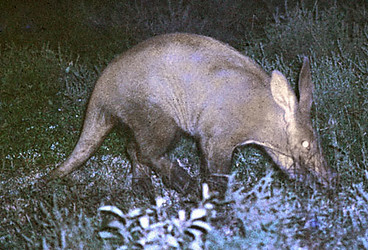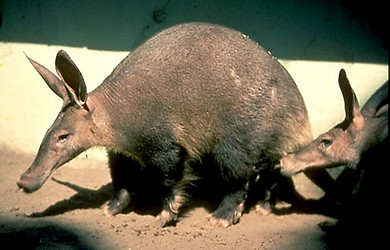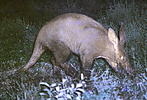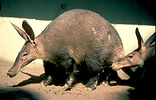Tubulidentata
aardvarks, ant bears
- Palaeorycteropus

- Archaeorycteropus

- Myorycteropus

- Orycteropus afer
- Leptorycteropus

References
Arnason, U., A. Gullberg, and A. Janke. 1999. The mitochondrial DNA molecule of the aardvark, Orycteropus afer, and the position of the Tubulidentata in the eutherian tree. Proceedings of the Royal Society of London Series B 266: 339-345.
Benirsch, K., D. H. Wurster, R. J. Low, N. B. Atkin. 1970. Chromosome complement of aardvark, Orycteropus afer. Chromosoma 31:68-&.
DeJong, W. W., A. Zweers, and M. Goodman. 1981. Relationship of aardvark to elephants, hyraxes and sea cows from alpha-crystallin sequences. Nature 292:538-540.
Madsen, O., P. M. T. Deen, G. Pesole, C. Saccone, and W. W. deJong. 1997. Molecular evolution of mammalian aquaporin-2: Further evidence that elephant shrew and aardvark join the paenungulate clade. Molecular Biology and Evolution 14:363-371.
McKenna, M. C. and S. K. Bell. 1997. Classification of Mammals Above the Species Level. Columbia University Press, New York.
Melton, D. A. 1976. The biology of the aardvark (Tubulidentata, Orycteropodidae). Mammal Review 6:75-88.
Nowak, R. M. 1999. Order Tubulidentata. Pages 1048-1049 in: Walker's Mammals of the World. Sixth Edition. Volume II. (R. M. Nowak). Johns Hopkins University Press, Baltimore.
Pathak, S., L. Shirley, M. L. Johnson. 1980. The chromosome-banding patterns of the aardvark Orycteropus afer (Tubulidentata, Orycteropidae). Experientia 36:547-548.
Patterson, B. 1978. Pholidota and Tubulidentata. Pages 268-278 in Evolution of African Mammals. V. J. Maglio and H. B. S. Cooke, eds. Harvard University Press, Cambridge, Massachusetts.
Pickford, M. 1996. Tubulidentata (Mammalia) from the middle and upper Miocene of southern Namibia. Comptes Rendus de l'Academie des Sciences Serie II Fascicule A-Sciences de la Terre et des Planetes 322:805-810.
Shoshani, J., C. A. Goldman, and J. G. M. Thewissen. 1988. Orycteropus afer. American Society of Mammalogists. Mammalian Species Account 300:1-8.
Thewissen, J. G. M. 1985. Cephalic evidence for the affinities of Tubulidentata. Mammalia 49:257-284.
Thewissen, J. G. M. and D. M. Badoux. 1986. The descriptive and functional myology of the fore-limb of the aardvark (Orycteropus afer, Pallas 1766). Anatomischer Anzeiger 162:109-123.
Information on the Internet
- Order Tubulidentata. Animal Diversity Web. University of Michigan Museum of Zoology.
- Tubulidentata. The Ultimate Ungulate Page.
- Afrotheria Specialist Group. IUCN - The World Conservation Union. Species Survival Commission.
- Aardvark. African Wildlife Foundation.
Title Illustrations

| Scientific Name | Orycteropus afer |
|---|---|
| Location | Serengeti National Park, Tanzania |
| Comments | Aardvarks are shy, solitary and completely nocturnal. They sleep in burrows by day and emerge to dig for termites after dark. This one was found by spotlighting on open grasslands. |
| Specimen Condition | Live Specimen |
| Identified By | David Bygott |
| Behavior | Foraging |
| Life Cycle Stage | Adult |
| View | Lateral |
| Copyright |
© 2005
David Bygott

|
| Scientific Name | Orycteropus afer |
|---|---|
| Location | captive specimen at Frankfurt Zoo (Germany) |
| Comments | aardvark |
| Creator | Lloyd Glenn Ingles |
| Specimen Condition | Live Specimen |
| Source Collection | CalPhotos |
| Copyright |
© 2001 California Academy of Sciences

|
About This Page
Page copyright © 2000
All Rights Reserved.
Citing this page:
Tree of Life Web Project. 2000. Tubulidentata. aardvarks, ant bears. Version 01 January 2000 (temporary). http://tolweb.org/Tubulidentata/15978/2000.01.01 in The Tree of Life Web Project, http://tolweb.org/










 Go to quick links
Go to quick search
Go to navigation for this section of the ToL site
Go to detailed links for the ToL site
Go to quick links
Go to quick search
Go to navigation for this section of the ToL site
Go to detailed links for the ToL site